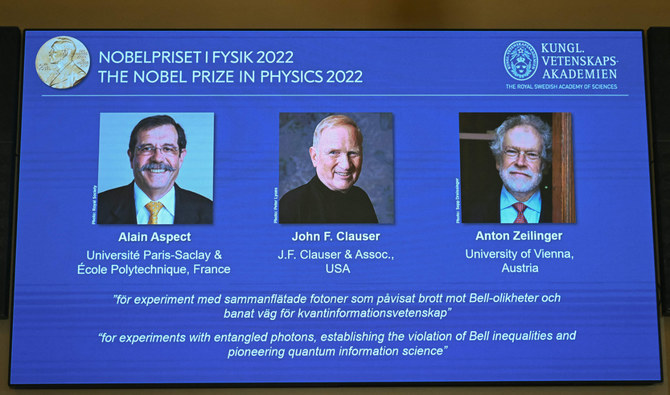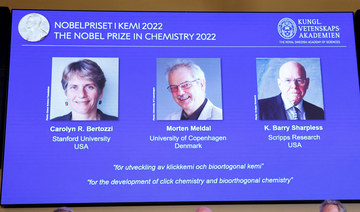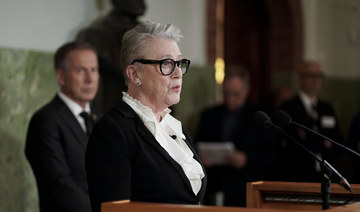STOCKHOLM, Sweden: Three scientists jointly won this year’s Nobel Prize in physics Tuesday for proving that tiny particles could retain a connection with each other even when separated, a phenomenon once doubted but now being explored for potential real-world applications such as encrypting information.
Frenchman Alain Aspect, American John F. Clauser and Austrian Anton Zeilinger were cited by the Royal Swedish Academy of Sciences for experiments proving the “totally crazy” field of quantum entanglements to be all too real. They demonstrated that unseen particles, such as photons, can be linked, or “entangled,” with each other even when they are separated by large distances.
It all goes back to a feature of the universe that even baffled Albert Einstein and connects matter and light in a tangled, chaotic way.
Bits of information or matter that used to be next to each other even though they are now separated have a connection or relationship — something that can conceivably help encrypt information or even teleport. A Chinese satellite now demonstrates this and potentially lightning fast quantum computers, still at the small and not quite useful stage, also rely on this entanglement. Others are even hoping to use it in superconducting material.
“It’s so weird,” Aspect said of entanglement in a telephone call with the Nobel committee. “I am accepting in my mental images something which is totally crazy.”
Yet the trio’s experiments showed it happens in real life.

“Why this happens I haven’t the foggiest,” Clauser told The Associated Press during a Zoom interview in which he got the official call from the Swedish Academy several hours after friends and media informed him of his award. “I have no understanding of how it works but entanglement appears to be very real.”
His fellow winners also said they can’t explain the how and why behind this effect. But each did ever more intricate experiments that prove it just is.
Clauser, 79, was awarded his prize for a 1972 experiment, cobbled together with scavenged equipment, that helped settle a famous debate about quantum mechanics between Einstein and famed physicist Niels Bohr. Einstein described “a spooky action at a distance” that he thought would eventually be disproved.
“I was betting on Einstein,” Clauser said. “But unfortunately I was wrong and Einstein was wrong and Bohr was right.”
Aspect said Einstein may have been technically wrong, but deserves huge credit for raising the right question that led to experiments proving quantum entanglement.
“Most people would assume that nature is made out of stuff distributed throughout space and time,” said Clauser, who while a high school student in the 1950s built a video game on a vacuum tube computer. “And that appears not to be the case.”
What the work shows is “parts of the universe — even those at great distances from each other — are connected,” said Johns Hopkins physicist N. Peter Armitage. “This is something so unintuitive and something so at odds with how we feel the world ‘should’ be.”
This hard-to-understand field started with thought experiments. But what in one sense is philosophical musings about the universe also holds hope for more secure and faster computers all based on entangled photons and matter that still interact no matter how distant.
“With my first experiments I was sometimes asked by the press what they were good for,” Zeilinger, 77, told reporters in Vienna. “And I said with pride: ‘It’s good for nothing. I’m doing this purely out of curiosity.’”
In quantum entanglement, establishing common information between two photons not near each other “allows us to do things like secret communication, in ways which weren’t possible to do before,” said David Haviland, chair of the Nobel Committee for Physics.
Quantum information “has broad and potential implications in areas such as secure information transfer, quantum computing and sensing technology,” said Eva Olsson, a member of the Nobel committee. “Its predictions have opened doors to another world, and it has also shaken the very foundations of how we interpret measurements.”
The kind of secure communication used by China’s Micius satellite — as well as by some banks — is a “success story of quantum entanglement,” said Harun Siljak of Trinity College Dublin. By using one entangled particle to create an encryption key, it ensures that only the person with the other entangled particle can decode the message and “the secret shared between these two sides is a proper secret,” Siljak said.
While quantum entanglement is “incredibly cool” security technologist Bruce Schneier, who teaches at Harvard, said it is fortifying an already secure part of information technology where other areas, including human factors and software are more of a problem. He likened it to installing a side door with 25 locks on an otherwise insecure house.
At a news conference, Aspect said real-world applications like the satellite were “fantastic.”
“I think we have progress toward quantum computing. I would not say that we are close,” the 75-year-old physicist said. “I don’t know if I will see it in my life. But I am an old man.”
Speaking by phone to a news conference after the announcement, the University of Vienna-based Zeilinger said he was “still kind of shocked” at hearing he had received the award.
Clauser, Aspect and Zeilinger have figured in Nobel speculation for more than a decade. In 2010 they won the Wolf Prize in Israel, seen as a possible precursor to the Nobel.
The Nobel committee said Clauser developed quantum theories first put forward in the 1960s into a practical experiment. Aspect was able to close a loophole in those theories, while Zeilinger demonstrated a phenomenon called quantum teleportation that effectively allows information to be transmitted over distances.
“Using entanglement you can transfer all the information which is carried by an object over to some other place where the object is, so to speak, reconstituted,” Zeilinger said. He added that this only works for tiny particles.
“It is not like in the Star Trek films (where one is) transporting something, certainly not the person, over some distance,” he said.
A week of Nobel Prize announcements kicked off Monday with Swedish scientist Svante Paabo receiving the award in medicine Monday for unlocking secrets of Neanderthal DNA that provided key insights into our immune system.
Chemistry is on Wednesday and literature on Thursday. The Nobel Peace Prize will be announced Friday and the economics award on Oct. 10.
The prizes carry a cash award of 10 million Swedish kronor (nearly $900,000) and will be handed out on Dec. 10. The money comes from a bequest left by the prize’s creator, Swedish dynamite inventor Alfred Nobel, who died in 1895.


























